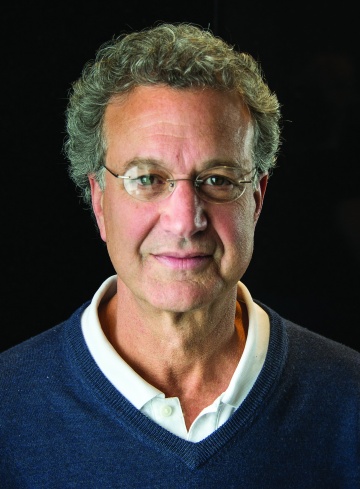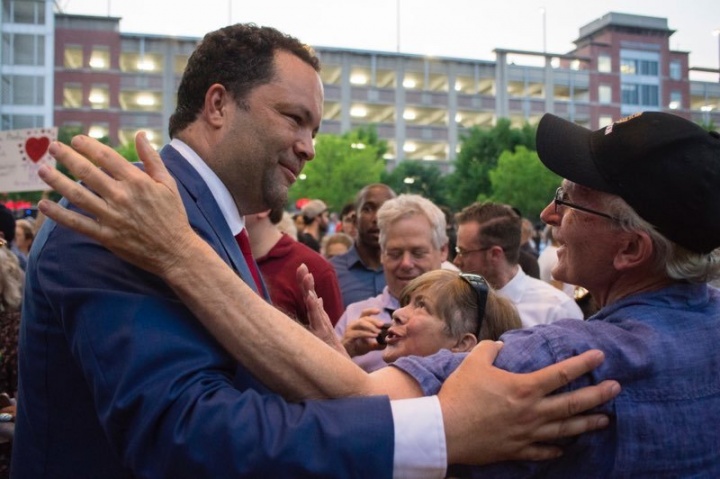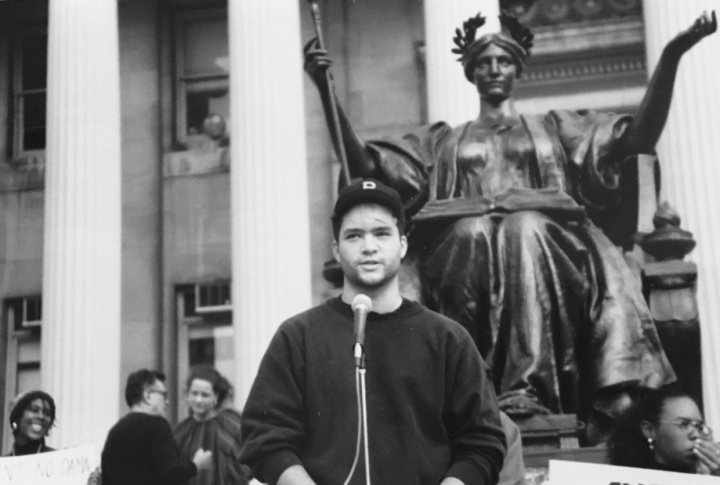Columbia College | Columbia University in the City of New York
“You Never Retire from the Fight”
Columbia College Today recently spoke with two alumni who were social justice warriors before the term became popular, civil rights leaders Ben Jealous ’94 and Richard Cohen ’76.
Jealous was president and CEO of the NAACP from 2008 to 2013. Last November he ran for governor of Maryland, losing to the popular GOP incumbent, Larry Hogan. Jealous has since founded 20X, a social impact investing and advisory firm based in Baltimore.

Richard Cohen ’76 spent 33 years with the Southern Poverty Law Center in Montgomery, Ala.
Courtesy Southern Poverty Law Center
As our discussion began, Jealous suggested modestly that he was only a former civil rights leader. Cohen replied: “You never retire from the fight, Ben.” What follows is an edited version of our March 1 conversation, which began with an issue dear to both men.
Columbia College Today: Ben, as part of a new wave of progressive leaders, how do you see the issue of voting rights?

Ben Jealous ’94 on the gubernatorial campaign trail in Silver Spring, Md.
The demographic trends south of the Mason-Dixon only go in one direction, which is for a more inclusive, progressive future. Since Obama’s reelection in 2012, of all the states south of the Mason-Dixon, Maryland has been the most likely to expand voting rights protections. We’ve also abolished the death penalty, passed marriage equality and passed the Dream Act.
If you look further south, to Georgia for instance, my old friend Stacey Abrams — with whom I’ve organized off and on since we were 20 years old — continues to fight hard because she knows that Georgia’s future is dramatically different than Georgia’s past. The opportunity to make leaps forward is real for our generation and all the generations who are alive at this moment. What it comes down to is preserving and protecting voter rights, and making sure everybody’s registered. We do those two things and we will see state after state south of the Mason-Dixon leap into the 21st century.
Richard Cohen ’76: I think everything that Ben said is absolutely right. Voter ID laws, cutbacks in early voting — these things are inimical to the spirit of the Constitution and the Voting Rights Act. But frankly the bigger problem is people not turning out. Hillary Clinton lost the 2016 election not because of voter suppression, but because her voters just didn’t seem to turn out.
Jealous: She lost because we’re still stuck with this crazy Electoral College scheme.
Cohen: Well, that too, there’s no question. But she would have won the Electoral College, as well as the popular vote, had her voters come out. After Trump was elected we saw incredible demonstrations like the Women’s March. The question was whether that momentum would continue. Then we had record levels of turnout in the midterms. I think that portends well for our democracy. If everyone participates in the political process, we’ll be a stronger country.
The SPLC spent over a million dollars in get-out-the-vote efforts in Florida because we wanted people to vote on the amendment that re-enfranchised persons with felony convictions. When you think about the number of votes that Bush II beat Gore by in 2000, you can see that that could be a real game changer. Not just in Florida, of course, but in the nation.
Jealous: Both parties need people who are prepared to lead us toward a day when every group will have to get along with at least one other group demographically in order to succeed democratically. The Republican Party’s future doesn’t have to be the Democratic Party’s past. The GOP could go back to its roots in the post-Civil War era and decide to be a party of the future. But right now they are playing what can only be a losing game, ultimately, attacking the fundamental rights of multiple groups in our society simultaneously.
Cohen: He doesn’t talk like an ex-civil rights leader, does he, Jamie? [laughter]
CCT: Let’s talk about the rise of domestic terrorism. Richard, the SPLC recently released its annual Intelligence Report on the year in hate and extremism. What were some of the findings? How alarmed are you at this point?

Cohen testifies before the House Subcommittee on National Security during a panel on “Radicalization in the U.S. and the Rise of Terrorism,” September 14, 2016
Courtesy SPLC
Until recently, hardcore white supremacists would typically sit out political campaigns because they thought both parties were irredeemably corrupt. A pox on both their houses. This time we saw people like David Duke openly endorsing Trump. Trump, of course, plays games with the white supremacist world, pretending that he doesn’t know who the likes of David Duke are. It’s more than a dog whistle, it’s a bullhorn. We saw that culminate in 2017 in Charlottesville. And, unfortunately it has continued.
At the same time that we’ve seen this increase in the number of hate groups, we’ve seen an equivalent spike in hate crimes. Both point to the way Trump has electrified the radical right.
CCT: Ben, did you feel the presence of these hate groups when you were campaigning in Maryland?
Jealous: Maryland has an active white supremacist element and has also seen horrific hate crimes. A black Army officer, 2nd Lt. Richard Collins III, was murdered on the University of Maryland campus just before his graduation from Bowie State — a young man who was active in white supremacist circles online just walked up to him and stabbed him in the chest. A man from northern Baltimore County traveled to New York City for the express purpose of killing a black man in the streets, and did that. We had two members of the [pro-Confederate] League of the South run against each other in Anne Arundel County, so now we have an admitted white supremacist on the council of one of the state’s largest counties. In some ways this shouldn’t be surprising. Our state song, “Maryland, My Maryland,” refers to Abraham Lincoln as a despot and a vandal, and refers to the Northern army as scum.
Cohen: You’re not going to hum a few bars of it now, are you? [laughter]
Jealous: Let me just read you a few bars: The despot’s heel is on the shore / Maryland, my Maryland / His torch is at thy temple door / Maryland, my Maryland / Avenge the patriotic gore / That flecked the streets of Baltimore. They’re talking about Abraham Lincoln. They’re celebrating the attack on the Northern army in Baltimore at the beginning of the Civil War. That’s why no one ever sings the full song.
CCT: Richard, you grew up in the South …
Cohen: I did. The second capital of the Confederacy: Richmond, Va. I lived just a few blocks from Monument Avenue, with its statues of J.E.B. Stuart, Stonewall Jackson, Robert E. Lee, Jefferson Davis and Matthew Fontaine Maury, the Confederate admiral. So it was everywhere. But those were unique times. We had the civil rights movement and the antiwar movement. Protest was in the air. [Civil rights leader] Julian Bond was my hero.
But when crosstown busing came to Richmond in 1970, my parents enrolled me in private school. I don’t like to think of them as bigots. I just think they were concerned about my education. But I refused to go and ended up in the local public schools. Sometimes I wonder whether my attitude was borne of principle or youthful belligerence. My mother once said, ‘Richard, I can answer that question for you — you were a belligerent son of a bitch.’ [laughter]
Jealous: One of the things that I’m proudest of from our campaign is that we made [Roger B.] Taney’s statue — presiding over the grounds of the state capitol in Annapolis, and over Charles Street in Baltimore — an issue. It was pulled down from both locations shortly thereafter. The Republican governor, who had previously referred to taking down Confederate statues as political correctness run amok, had to concede the wisdom of finally pulling down the statue of a Chief Justice who said that black people had no rights that white people were bound to respect. So it’s possible for us to evolve and to move forward, for people to come together across party lines, across race lines, across even old patterns of behavior. But it requires courage on both sides, and candor on both sides, and the willingness to evolve.
Cohen: People nowadays feel like they have a license to say whatever is in the darkest places in their heart. The social fabric of our nation — built up over generations through our churches, our schools, our houses of worship — has been frayed as a result. I don’t think it’s a simple task, quite frankly, to put them back together.
CCT: You often hear that we need to have a national conversation, but sometimes well-meaning people speak up and are shamed because they are insufficiently woke. Or they’re too intimidated to say anything, lest they be lumped in with the bigots and the bad guys. Doesn’t this preclude a real conversation?
Jealous: I think we all just need to comport ourselves in the public square the way that we raise our children to comport themselves in class. Bigotry has no place, but every honest question should be tolerated. If folks are curious, if they’re trying to understand, but they ask a question in the wrong way, that’s very different than if you call somebody a name, or attack a group’s very essence or equality. We all know how to speak to each other. A good place to start is simply casting the epithets aside and speaking the English that we were taught in school.
CCT: This leads right to a question about an issue that’s very much alive on campuses across the nation. Some forms of speech have come to be regarded not just as offensive and worthy of condemnation, but also as violent assault, as surely as physical attack. Where do you draw the line in an institution like a university, where some members believe they should be protected from hurtful ideas and speech?
Cohen: I’ve been very much involved in these kind of issues; I’ve testified before Congress a few times about it. I come down on the side of free speech and freedom of expression, but sometimes I think the issue is not so much the right of the speaker, but the right of the listener. If the Young Republicans want to invite Richard Spencer or Charles Murray to come and talk to them, it seems to me that that’s their prerogative. And if people object to them coming on campus, they can say so. I don’t think students should have the right to stop other people from listening to who they want to listen to, any more than they can stop them from reading what they want to read. So I think what’s happened on a number of campuses is deeply disturbing, quite frankly. I understand the point of protest, but I think we ought to be really darn careful before we trample on the right of students to listen to who they want to listen to, however misguided we might think it is.
Jealous: Oftentimes when those speakers come to campus, they end up discouraging people, converting people away from them. A lot of the most controversial speakers are troubling even to people who thought that they might be a fan before they actually heard them out. I saw it happen in my years as a student. I’ve seen it happen in my years teaching at Princeton. I think we forget that one of the benefits of letting bigots speak their mind is that their mind’s pretty offensive.
CCT: What were some of your own formative experiences at Columbia?
Cohen: I was a young and naive philosophy major — my favorite teachers were Arthur Danto GSAS’53 and Raymond Geuss ’66, GSAS’71 — and I was desperately searching for the meaning of life. I’m not sure I ever found it, but I found the calling of my life.
I think many of my classmates harbored assumptions about me simply because I was a southerner. But ironically, while there had been a lot of white flight in Richmond, there hadn’t been any particular violence; meanwhile, Roxbury in Boston was exploding over busing. Yonkers was exploding. So I guess in some ways my time at Columbia made me realize that deep-seated racism was not the exclusive province of the old states of the Confederacy. It was pervasive throughout the country.

Jealous at a campus rally for need-blind financial aid, circa 1992.
Courtesy Spectator staff

